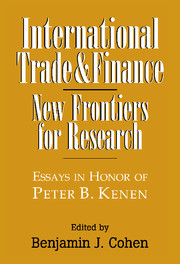Book contents
- Frontmatter
- Contents
- List of contributors
- Introduction
- 1 The practical theorist: Peter Kenen's contribution to international economics
- I International trade theory
- 2 Nature, capital, and trade: A second look
- 3 The Meade model of preferential trading: History, analytics and policy implications
- 4 International trade and big government
- II International monetary theory
- III Applied policy analysis
- Index
2 - Nature, capital, and trade: A second look
Published online by Cambridge University Press: 11 September 2009
- Frontmatter
- Contents
- List of contributors
- Introduction
- 1 The practical theorist: Peter Kenen's contribution to international economics
- I International trade theory
- 2 Nature, capital, and trade: A second look
- 3 The Meade model of preferential trading: History, analytics and policy implications
- 4 International trade and big government
- II International monetary theory
- III Applied policy analysis
- Index
Summary
Peter Kenen has in recent years been better known for his analysis of international financial markets, but it is interesting to note that one of his first contributions to the economic literature was an article on trade theory. That article, modestly entitled “Nature, Capital, and Trade” (1965), illustrates a number of features of Kenen's research style. First was his preoccupation with real-world outcomes: his goal in that research effort was an explanation for the empirical observation of non-equalized factor prices and the Leontief paradox in the context of theoretical trade theory. Second was his reluctance to let international finance remain submerged, even in a model of international trade. Third was his willingness to shake the foundations of the theory to get at a restatement that fit the historical facts.
The fundamental proposition of the article (hereafter referred to as NCT) was that the empirical “irregularities” of factor price non-equalization and the Leontief paradox signaled a misspecification of the productive technology in theoretical models. Specifically, he posited that capital did not belong in the aggregate production function in the factor-proportions explanations (notably, the Heckscher–Ohlin [or HO] presentation) of trade theory, but rather entered production by improving the services offered by land and labor, the “natural” endowments. He laid out the logical implications of his conjecture in a mathematical model, and demonstrated that this alternative specification created an ingenious extension of the then-standard 2 × 2 HO trade model.
- Type
- Chapter
- Information
- International Trade and FinanceNew Frontiers for Research, pp. 31 - 56Publisher: Cambridge University PressPrint publication year: 1997



